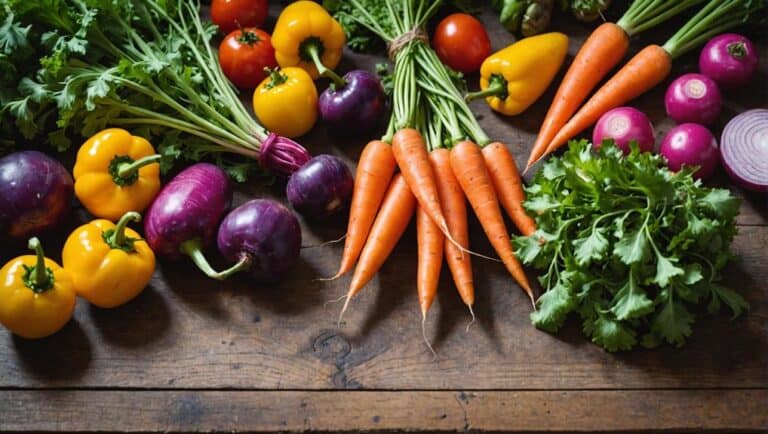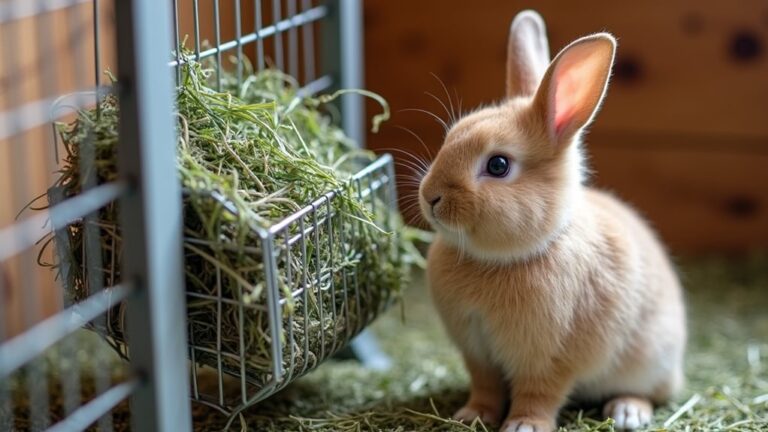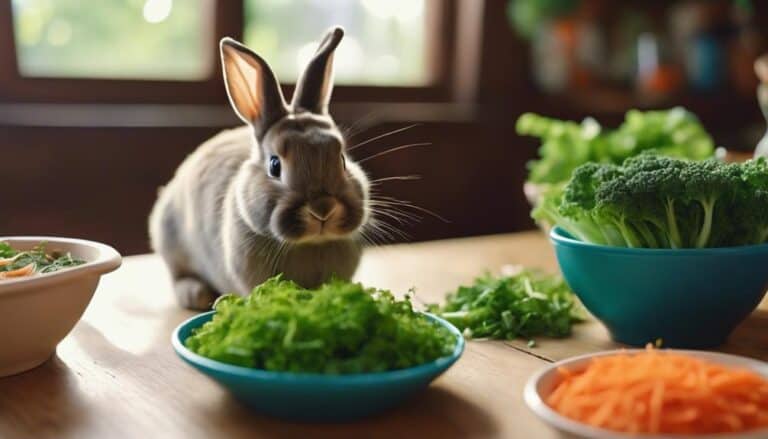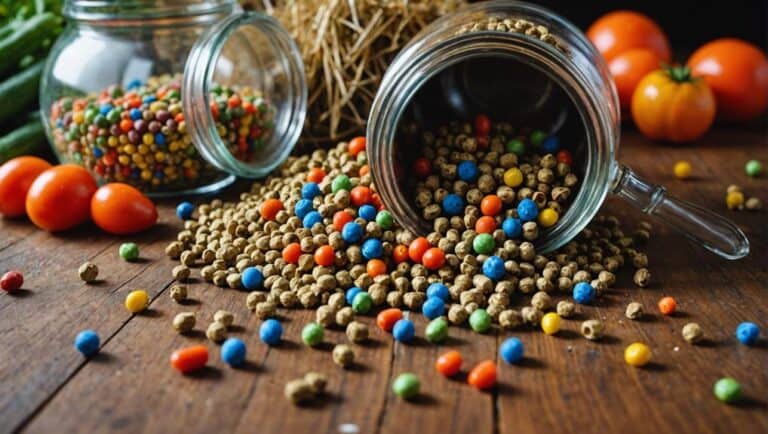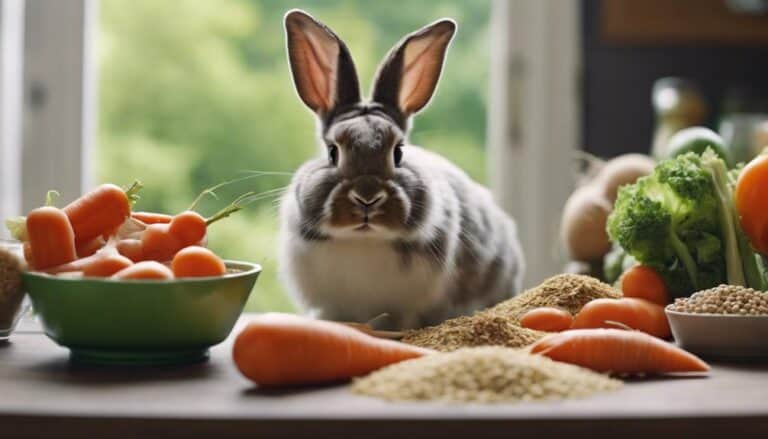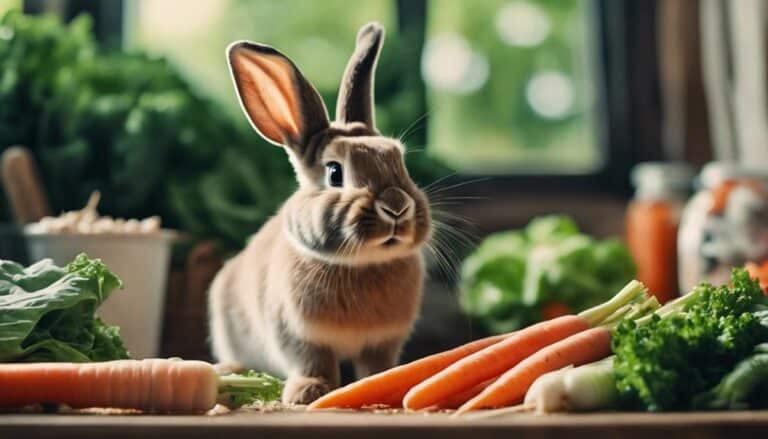While a young rabbit thrives on a varied diet, senior rabbits face unique nutritional challenges that require careful consideration. You may wonder what specific foods can support their aging bodies and maintain their health. It’s essential to focus on high-fiber hay and fresh vegetables, but there’s more to it than just that. Understanding the importance of portion control and hydration can make a significant difference in their well-being, especially as you start to navigate their changing dietary needs. What other factors should you keep in mind to guarantee they’re getting the best care possible? In addition to providing a balanced diet, it’s crucial to regularly monitor your senior rabbit’s weight and adjust their food intake accordingly to prevent obesity or malnutrition. Enhanced attention to dental health is also vital, as older rabbits may struggle with chewing due to dental issues that can arise with age. By being proactive about these aspects, you ensure that their senior rabbit nutritional needs are met, ultimately contributing to a happier and healthier life for your furry companion.
Contents
Senior Rabbit Age Classifications
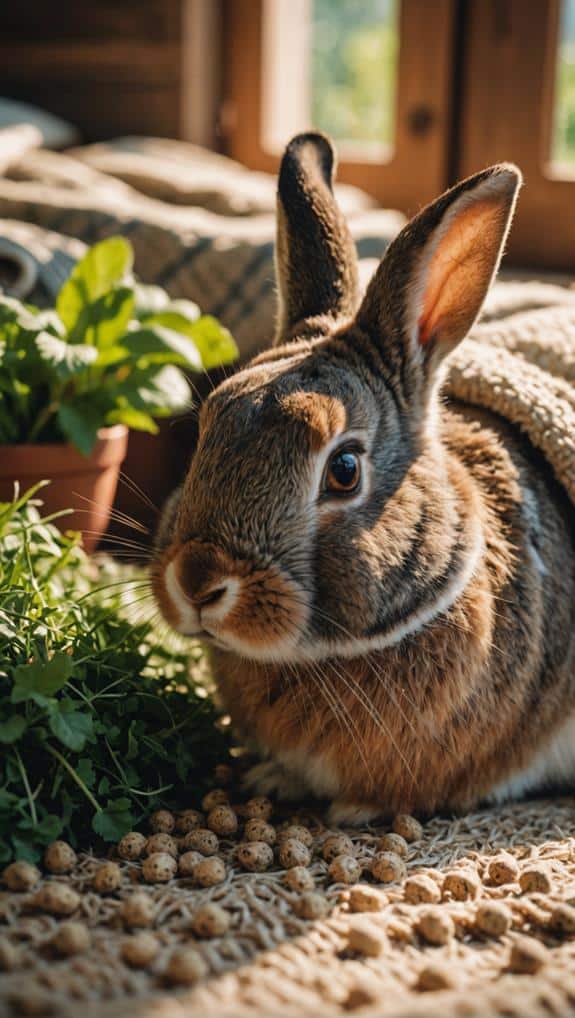
When it comes to understanding senior rabbit age classifications, it's vital to recognize that age varies considerably among different breeds. Small breeds are generally considered senior at around 8 years old, while medium breeds reach this classification at 6 years, and large breeds at just 4 years. Understanding these distinctions helps you provide better care for your rabbit based on its specific needs.
Additionally, as rabbits age, they may face unique health challenges due to their anatomical inability to vomit, which can lead to serious digestive issues if not monitored properly the inability to vomit.
The estimated lifespan for small rabbits typically ranges from 12 to 13 years, medium breeds live around 9 to 10 years, and large breeds have a shorter lifespan of 4 to 7 years. However, individual rabbits may age differently, so regular assessments for specific aging signs are important.
Seniors might show variations in activity level and health; some can remain active until they're 9 or 10 years old despite being classified as seniors. As you monitor their weight and overall well-being, keep in mind that age-related changes can notably differ between individuals.
If you have concerns about your rabbit's health or aging signs, consulting a veterinarian is vital to guarantee your pet receives the care it deserves.
Essential Nutritional Components
To keep senior rabbits healthy, it's vital to focus on their nutritional needs, which differ from those of younger rabbits. A senior rabbit's diet should primarily consist of high-fiber hay, making up the bulk of their daily intake to support digestive health. This fibrous diet is necessary for maintaining proper gut function and preventing issues such as obesity or gastrointestinal stasis.
Additionally, regular monitoring of their dietary intake can help prevent potential health issues and enhance their overall well-being, as noted in tailored nutrition.
While adult rabbits might receive about 1 tablespoon of pellets per kg of body weight, seniors may need slightly more to prevent weight loss and maintain energy levels. Fresh vegetables can be included but should be limited, especially varieties high in calcium, to avoid complications from excess calcium intake.
Hydration is equally important. Make certain your senior rabbit has constant access to clean water, providing both bowls and bottles to accommodate their preferences.
Regular weight monitoring is necessary; adjust their diet and portion sizes based on any changes to keep their weight within a healthy range. By focusing on these vital nutritional components, you'll help meet the dietary needs of senior rabbits, making sure they remain healthy, hydrated, and full of energy.
Breed-Specific Dietary Needs
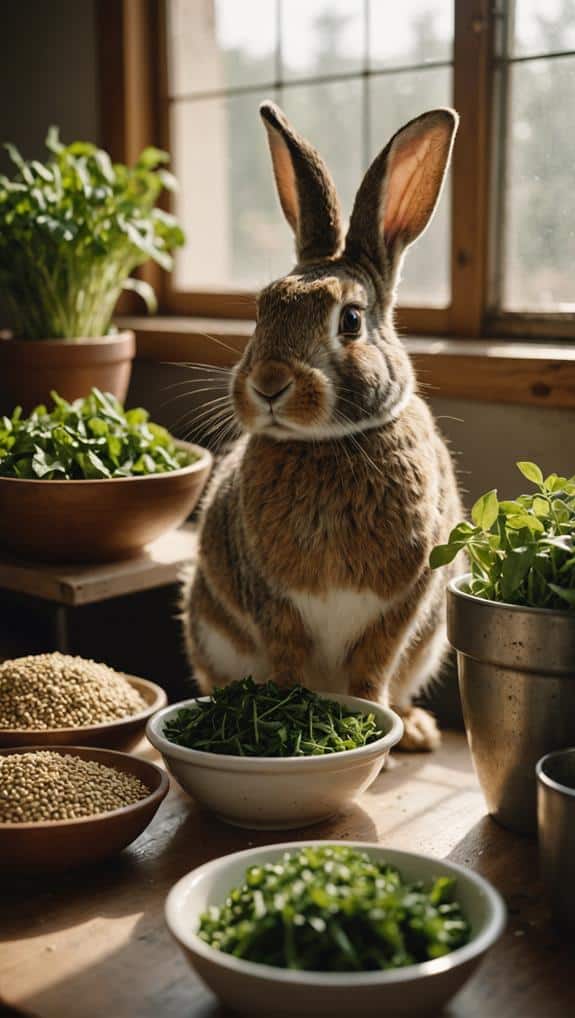
Understanding breed-specific dietary needs is important for maintaining the health of senior rabbits. Small and medium breeds generally thrive on a diet rich in high-fiber hay and fresh greens, along with about one tablespoon of pellets per kilogram of body weight.
As your rabbits enter their senior years, you may need to make slight adjustments to accommodate their changing nutrient needs. Additionally, providing high-fiber hay is essential for digestive health and preventing dental issues as they age.
For large breed rabbits, the focus should be on high-fiber hay, important for their digestive health. These breeds often have shorter lifespans and may face dental issues, necessitating a diet that's lower in concentrated feeds.
Senior rabbits of all breeds can benefit from pellets formulated specifically for elderly rabbits. These contain enhanced nutrients tailored to their reduced activity levels and unique dietary needs.
It's also critical to monitor their weight regularly; if your rabbit is losing weight, consider increasing the pellet intake, while weight gain may require a reduction.
Lastly, you should always tailor dietary adjustments based on your rabbit's health status and veterinary recommendations, ensuring they receive ideal nutrition throughout their golden years.
Portion Control for Seniors
As senior rabbits age, managing their portion sizes becomes increasingly significant to maintain a healthy weight and overall well-being. For these rabbits, you might consider providing slightly higher amounts of pellets than for adults, with a suggested portion of one egg cup daily. However, it's imperative to adjust this based on their individual weight changes.
Weekly weight monitoring is critical, as seniors often require adjustments to their pellet intake to prevent unhealthy weight loss or gain. While pellets play a role in their diet, fresh hay should dominate, ideally provided in an amount that equals their body size daily. This guarantees proper digestive health.
If you notice your rabbit is losing weight, consider increasing the pellet portion slightly but do so gradually to avoid digestive issues. Additionally, offering a combination of hay and age-appropriate nuggets is beneficial.
Don't forget to guarantee they've constant access to clean water, as meeting their hydration needs is essential for their overall health. By carefully managing portions, you can support your senior rabbit's well-being and contribute to a happy, healthy life.
Monitoring Weight Changes
Regularly monitoring the weight of your senior rabbit is essential for maintaining their health and well-being. By weighing your rabbit weekly, you can identify any significant changes that may indicate health issues or necessary dietary adjustments. Use a standard bathroom scale for convenience, ensuring you place your rabbit on it at the same time each week for consistent measurements.
Be mindful of their weight, as both weight loss and weight gain can signify problems. If your senior rabbit loses more than 10% of their body weight in a short period, it's vital to consult a veterinarian promptly.
You should also consider a suitable portion of pellets, typically about one egg cup per feeding, adjusting as needed based on their activity level.
It's important to track trends in their weight over time. Weight gain can lead to obesity, resulting in serious health complications like diabetes and arthritis.
Hydration Requirements
Ensuring senior rabbits have constant access to fresh, clean water is essential for their digestive health and overall well-being. Meeting their hydration needs is vital, as it supports their bodily functions and helps prevent urinary issues.
You should provide water in both bowls and bottles to accommodate their drinking preferences, making it easier for them to stay hydrated. Regularly monitor water intake, as decreased consumption might signal underlying health problems that require veterinary attention.
It's also important to take into account that senior rabbits may face mobility challenges, so placing water sources in easily accessible locations can encourage proper hydration.
In addition to providing clean water, you can supplement their hydration through high-water-content vegetables like cucumbers and leafy greens. These not only contribute to their dietary needs but also enhance their overall hydration levels.
Adjusting Diet for Health Issues
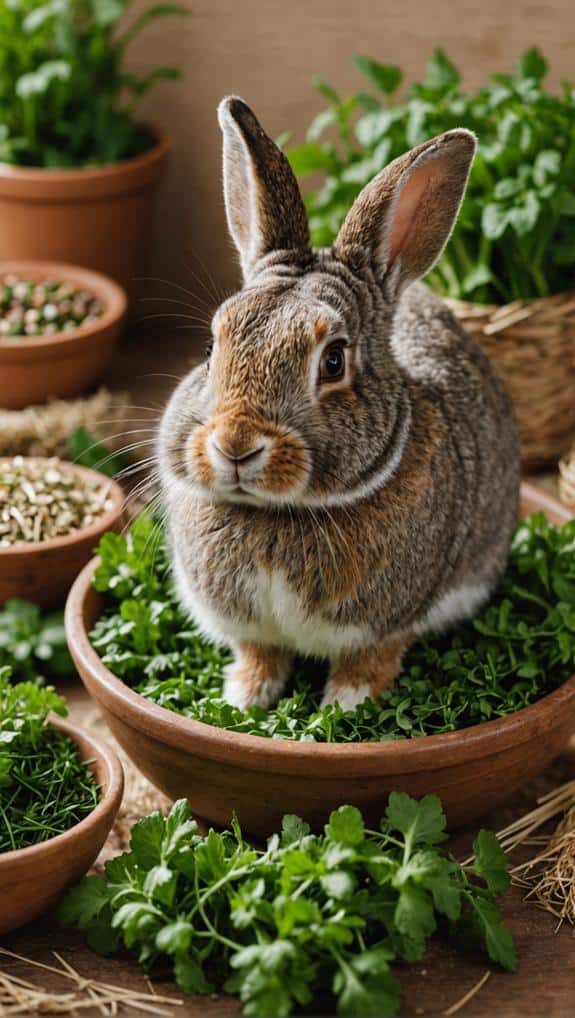
Adjusting a senior rabbit's diet is fundamental when addressing specific health issues that may arise with age. As rabbits grow older, they often experience weight loss, making it essential to increase their pellet intake. For portion control, consider offering one egg cup of pellets based on their size.
A hay-centric diet remains important, providing various types of hay to guarantee high fiber content, which promotes digestive health. Senior rabbits are particularly prone to gastrointestinal issues, so maintaining a balanced diet is key.
Incorporating fresh leafy greens can be advantageous but should be introduced gradually to avoid digestive upset. Be cautious with high-calcium vegetables, as these can contribute to urinary tract problems in aging rabbits.
Monitoring their water intake is equally important; providing both water bottles and bowls allows them to choose their preferred hydration method.
Incorporating Supplements and Treats
Incorporating supplements and treats into your senior rabbit's diet can greatly enhance their overall health and well-being. One effective approach is adding probiotic powders, which can improve digestive health, especially for rabbits with decreased gut motility or sensitivity to diet changes.
Including fresh herbs like parsley or basil can also be beneficial, as they provide crucial vitamins and stimulate your rabbit's appetite, making mealtime more enjoyable.
When it comes to treats, limit them to 5% of your rabbit's total diet. Fresh fruits, such as apple slices or berries, can be offered in moderation. They deliver essential nutrients, but be mindful of their high sugar content.
Additionally, consider Omega-3 fatty acid supplements, like flaxseed oil, to help manage arthritis symptoms by reducing inflammation and promoting joint health.
Remember to introduce any new supplements or treats gradually. This allows you to monitor your rabbit for any adverse reactions or digestive issues.
Final Thoughts
In the journey of your senior rabbit's life, their diet is like a carefully woven tapestry, each thread representing essential nutrients that support their health. By focusing on high-fiber hay, fresh veggies, and specialized pellets, you guarantee a vibrant, healthy existence for your furry companion. Remember, as their caretaker, you're the gentle gardener nurturing this delicate balance, adjusting portions and monitoring weight to foster a flourishing and fulfilling life in their golden years.

